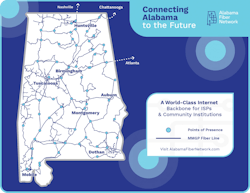Alabama Fiber Network (AFN) nearly completes statewide middle-mile network build
What is the Alabama Fiber Network (AFN)?
The Alabama Fiber Network (AFN) is a middle-mile executor for Be Linked's statewide broadband plan and involves electric co-ops and partners that contributed dark fiber strands and expertise.
See more coverage of AFN here:
Alabama Fiber Network (AFN) wraps first phase of middle mile network
The Alabama Fiber Network (AFN) reached a key goal this week by completing a significant portion of its state-wide middle-mile network.
AFN can provide service to 60 counties with 3,406 active miles of the network. Points of presence have been constructed in 62 locations, and three more counties will soon be online.
By completing this network phase, AFN nearly fulfills the $82.5 million middle-mile grant from the state’s allocation of ARPA funds.
Also, AFN received two additional grants to support the connection of community anchor institutions, further expanding the network's depth and breadth.
The network focuses on bridging the broadband divide in areas of the state that lack affordable broadband. Building a middle-mile network gives service providers another option to backhaul broadband traffic.
While AFN does not directly serve end-users, the network provides access points in each county that community anchor institutions, last-mile providers, and wireless providers utilize for connectivity.
AFN was established to address the lack of middle-mile connectivity in rural Alabama. Eight electric cooperatives and their subsidiaries: Central Alabama Electric Cooperative, Coosa Valley Electric Cooperative, Covington Electric Cooperative, Cooperative Connection LLC (a subsidiary of Cullman Electric Cooperative), JWEMC Communications LLC (a subsidiary of Joe Wheeler Electric Membership Cooperative), North Alabama Electric Cooperative, Tombigbee Electric Cooperative, and PowerSouth Energy Cooperative collaborated with fiber lease partner Alabama Power Company to deliver middle-mile network.
AFN delivers access to a network with at least 400 Gbps capacity and the ability to scale up to 24 Tbps. Access to the AFN network enables local broadband providers with connections for education, public safety, health care and economic development.
Matt Dunne, founder and executive director of the Center on Rural Innovation, praised Governor Ivey and the Alabama legislature for their vision. “Alabama has become a national model for state initiative and success in broadband policy and strategy, showcasing the effectiveness of early planning, substantial executive and legislative support, and strategic use of federal funds,” wrote Dunne in a Benton Institute for Broadband and Society article.
For related articles, visit the Broadband Topic Center.
For more information on high-speed transmission systems and suppliers, visit the Lightwave Buyer’s Guide.
To stay abreast of fiber network deployments, subscribe to Lightwave’s Service Providers and Datacom/Data Center newsletters.
About the Author
Sean Buckley
Sean is responsible for establishing and executing the editorial strategy of Lightwave across its website, email newsletters, events, and other information products.


